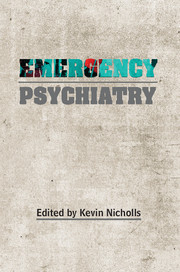Book contents
- Frontmatter
- Contents
- List of contributors
- Acknowledgements
- Preface
- 1 Assessment of suicide risk
- 2 Violence and aggression
- 3 Substance misuse emergencies
- 4 Alcohol and psychiatric emergencies
- 5 Acute psychosis
- 6 Acute side-effects of psychotropic medication
- 7 Emergencies in child and adolescent psychiatry
- 8 The psychiatric intensive care unit
- 9 Safeguarding
- 10 Emergency electroconvulsive therapy
- 11 Life-threatening medical emergencies in a mental health unit
- 12 Emergencies in intellectual disability psychiatry
- 13 Emergencies in older persons’ psychiatry
- 14 Perinatal psychiatric emergencies
- 15 Civilian and military psychological trauma
- 16 Emergencies in liaison psychiatry
- 17 Psychiatric emergencies in deaf people
- 18 Mental health law
- 19 Self-poisoning: aspects of assessment and initial care
- Index
17 - Psychiatric emergencies in deaf people
Published online by Cambridge University Press: 01 January 2018
- Frontmatter
- Contents
- List of contributors
- Acknowledgements
- Preface
- 1 Assessment of suicide risk
- 2 Violence and aggression
- 3 Substance misuse emergencies
- 4 Alcohol and psychiatric emergencies
- 5 Acute psychosis
- 6 Acute side-effects of psychotropic medication
- 7 Emergencies in child and adolescent psychiatry
- 8 The psychiatric intensive care unit
- 9 Safeguarding
- 10 Emergency electroconvulsive therapy
- 11 Life-threatening medical emergencies in a mental health unit
- 12 Emergencies in intellectual disability psychiatry
- 13 Emergencies in older persons’ psychiatry
- 14 Perinatal psychiatric emergencies
- 15 Civilian and military psychological trauma
- 16 Emergencies in liaison psychiatry
- 17 Psychiatric emergencies in deaf people
- 18 Mental health law
- 19 Self-poisoning: aspects of assessment and initial care
- Index
Summary
Deafness is a blanket term that covers many different conditions. Some people are born deaf and others become deaf at some stage in their lives. Age at onset, degree of deafness and level of functional impairment can all influence a deaf person's self-image, communication preferences and cultural identity (Baines, 2007). There are different implications of deafness for those deaf from birth or an early age (pre-lingually deaf) and for those who have acquired deafness at a later stage, when verbal language might be present (Table 17.1). It is difficult to precisely define deafness, as hearing itself encompasses complex characteristics such as intensity, loudness, pitch and frequency, and is very much a subjective experience. However, there is a general consensus on differentiating hearing loss on the basis of intensity or loudness on a continuum: mild (25–40 dB), moderate (41–70 dB), severe (71–95 dB) and profound (>96 dB).
Partial deafness is said to affect those with mild, moderate or severe hearing loss who might benefit from hearing aids or cochlear implants to hear speech. Some might internalise verbal language (use of words) and, therefore, gain some benefit from lip-reading. It is important to realise that these people might have specialised communication needs and experience difficulties when in groups or when there is background noise. Profound deafness affects people who have little or no hearing for speech, who might obtain some benefit from hearing aids for environmental sounds. It occurs in approximately 8 in 1000 (0.8%) of the population, with this having its onset in early childhood in 1 in 1000. Of the children who are born deaf (congenital deafness) approximately 50% will have a genetic cause for this, that is some chromosomal disorder which included deafness as one of its symptoms, and the other 50% with have a different cause such as maternal infection with rubella or influenza, or some sort of birth injury.
Around 20% of the general population have a hearing loss of >20 dB, and this proportion rises to 75% of those over 75 years of age. However, these are people who are described as ‘deafened’ or ‘hard of hearing’, and their hearing loss is part of the normal ageing process. They might have some residual hearing and essentially they belong to the wider hearing community.
- Type
- Chapter
- Information
- Emergency Psychiatry , pp. 286 - 296Publisher: Royal College of PsychiatristsPrint publication year: 2015



